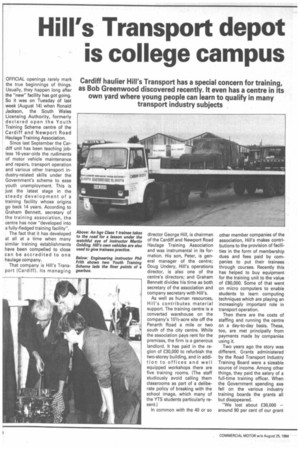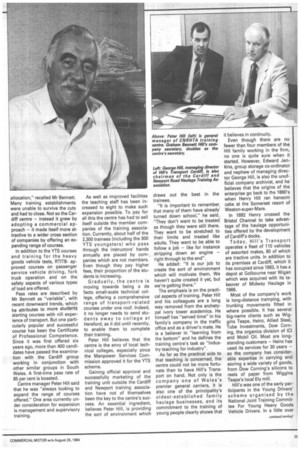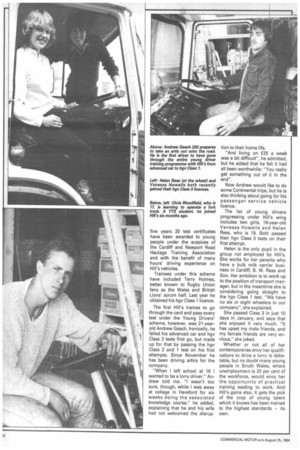Hill's Transport depot is college campus
Page 32

Page 33

Page 34

If you've noticed an error in this article please click here to report it so we can fix it.
Cardiff haulier Hill's Transport has a special concern for training, as Bob Greenwood discovered recently. It even has a centre in its own yard where young people can learn to qualify in many transport industry subjects
OFFICIAL openings rarely mark the true beginnings of things. Usually, they happen long after the "new" facility has got going. So it was on Tuesday of last week (August 14) when Ronald Jackson, the South Wales Licensing Authority, formerly declared open the Youth Training Scheme centre of the Cardiff and Newport Road Haulage Training Association.
Since last September the Cardiff unit has been teaching jobless 16-year-olds the rudiments of motor vehicle maintenance and repairs, transport operation and various other transport industry-related skills under the Government's scheme to ease youth unemployment. This is just the latest stage in the steady development of a training facility whose origins go back 14 years. According to Graham Bennett, secretary of the training association, the centre has now "developed into a fully-fledged training facility".
The fact that it has developed at all at a time when many similar training establishments have been compelled to close can be accredited to one haulage company.
That company is Hill's Transport (Cardiff). Its managing director George Hill, is chairman of the Cardiff and Newport Road Haulage Training Association and was instrumental in its formation. His son, Peter, is general manager of the centre; Doug Undery, Hill's operations director, is also one of the centre's directors; and Graham Bennett divides his time as both secretary of the association and company secretary with Hill's.
As well as human resources, Hill's contributes material support. The training centre is a converted warehouse on the company's 101/2-acre site off the Penarth Road a mile or two south of the city centre. While the association pays rent for the premises, the firm is a generous landlord. It has paid in the region of £30,000 to refurbish the two-storey building, and in addition to offices and well equipped workshops there are five training rooms. (The staff studiously avoid calling them classrooms as part of a deliberate policy of breaking with the school image, which many of the YTS students particularly resent,) In common with the 40 or so other member companies of the association, Hill's makes contributions to the provision of facilities in the form of membership dues and fees paid by companies to put their trainees through courses. Recently this has helped to buy equipment for the training unit to the value of £80,000. Some of that went on micro computers to enable students to learn computing techniques which are playing an increasingly important role in transport operation.
Then there are the costs of staffing and running the centre on a day-to-day basis. These, too, are met principally from payments made by companies using it.
Two years ago the story was different. Grants administered by the Road Transport Industry Training Board were a sizeable source of income. Among other things, they paid the salary of a full-time training officer. When the Government spending axe fell on the various industry training boards the grants all but disappeared.
"We lost about £30,000 — around 90 per cent of our grant allocation," recalled Mr Bennett. Many training establishments were unable to survive the cuts and had to close. Not so the Cardiff centre — instead it grew by adopting a commercial approach — it made itself more attractive to a wider cross section of companies by offering an expanding range of courses.
In addition to the YTS courses and training for the heavy goods vehicle tests, RTITBapproved courses on passenger service vehicle driving, fork truck operation and on the safety aspects of various types of load are offered.
Pass rates are described by Mr Bennett as "variable", with recent downward trends, which he attributes to more students starting courses with nill experience of transport. But one particularly popular and successful course has been the Certificate of Professional Competence. Since it was first offered six years ago, more than 400 candidates have passed the examination with the Cardiff group working in conjunction with other similar groups in South Wales. A first-time pass rate of 85 per cent is boasted.
Centre manager Peter Hill said that he was "always looking to expand the range of courses offered." One area currently under consideration for expansion is management and supervisory training. As well as improved facilities the teaching staff has been increased to eight to make such expansion possible. To pay for all this the centre has had to sell itself outside the member companies of the training association. Currently, about half of the 2,300 trainees (including the 300 YTS youngsters) who pass through the instructors' hands annually are placed by companies which are not members. Even though they pay higher fees, their proportion of the students is increasing.
Gradually, the centre is moving towards being a de facto small-scale technical college, offering a comprehensive range of transport-related courses under one roof. Indeed, it no longer needs to send students away to college at Hereford, as it did until recently, to enable them to complete their training.
Peter Hill believes that the centre is the envy of local technical colleges, especially since the Manpower Services Commission approved it for the YTS scheme.
Gaining official approval and successfully marketing of the training unit outside the Cardiff and Newport training association have not of themselves been the key to the centre's success. An essential ingredient, believes Peter Hill, is providing the sort of environment which draws out the best in the trainees.
"It is important to remember that many of them have already turned down school," he said. "They don't want to be treated as though they were still there. They want to be stretched to their limits and treated like adults. They want to be able to follow a job — like for instance stripping down an engine — right through to the end".
He added: "It is our job to create the sort of environment which will motivate them. We haven't quite created it yet, but we're getting there."
The emphasis is on the practical aspects of training. Peter Hill and his colleagues are a long way removed from the archetypal ivory tower academics. He himself has "served time" in his family's company in the traffic office and as a driver's mate. He is a believer in "learning from the bottom" and he defines the training centre's task as "industry teaching for industry".
As far as the practical side to that teaching is concerned, the centre could not be more fortunate than to have Hill's Transport on hand. Not only is the company one of Wales's premier general carriers, it is also one of the principality's oldest-established family haulage businesses, and its commitment to the training of young people clearly shows that it believes in continuity.
Even though there are no fewer than four members of the Hill family working in the firm, no one is quite sure when it started. However, Edward Jenkins, group storage co-ordinator and nephew of managing director George Hill, is also the unofficial company archivist, and he believes that the origins of the enterprise go back to the 1880's when Henry Hill ran hansom cabs at the Somerset resort of Weston-super-Mare.
In 1892 Henry crossed the Bristol Channel to take advantage of the haulage opportunities offered by the development of Cardiff's docks.
Today, Hill's Transport operates a fleet of 110 vehicles of assorted makes, 80 of which are tractive units. In addition to its premises at Cardiff, which it has occupied since 1963, it has a depot at Golbourne near Wigan which was acquired with its takeover of Midway Haulage in 1966.
Most of the company's work is long-distance tramping, with trunking movements fitted in where possible. It has several big-name clients such as Wiggins Teape, Heinz, Allied Steel, Tube Investments, Dow Corning, the organics division of ICI and Mobil Oil. Most are longstanding customers — Heinz has used its services for 30 years — so the company has considerable expertise in carrying and storing a wide variety of goods, from Dow Corning's silicons to reels of paper from Wiggins Teape's local Ely mill.
Hill's was one of the early participants in the Young Drivers' scheme organised by the National Joint Training Committee For Young Heavy Goods Vehicle Drivers. In a little over five years 20 test certificates have been awarded to young people under the auspices of the Cardiff and Newport Road Haulage Training Association and with the benefit of many hours' driving experience on Hill's vehicles.
Trainees under this scheme have included Terry Holmes, better known to Rugby Union fans as the Wales and British _Lions' scrum half. Last year he obtained his hgv Class 1 licence.
The first Hill's trainee to go through the card and pass every test under the Young Drivers' scheme, however, was 21-yearold Andrew Geach. Ironically, he failed his advanced car and hgv Class 3 tests first go, but made up for that by passing the hgv Class 2 and 1 test on his first attempts. Since November he has been driving artics for the company.
"When I left school at 16 I wanted to be a lorry driver." Andrew told me. "I wasn't too sure, though, while I was away at college in Hereford for six weeks doing the associated knowledge course," he added, explaining that he and his wife had not welcomed the disrup tion to their home life.
"And living on £25 a week was a bit difficult", he admitted, but he added that he felt it had all been worthwhile: "You really get something out of it in the end".
Now Andrew would like to do some Continental trips, but he is also thinking about going for his passenger service vehicle licence.
The list of young drivers progressing under Hill's wing includes two girls, 18-year-old Vanessa Howells and Helen Rees, who is 19. Both passed their hgv Class 3 tests on their first attempt.
Helen is the only pupil in the group not employed by Hill's. She works for her parents who have a bulk milk carrier business in Cardiff, B. W. Rees and Son. Her ambition is to work up to the position of transport manager, but in the meantime she is considering going straight to the hgv Class 1 test. "We have no six or eight wheelers in our company", she explained.
She passed Class 3 in just 10 days in January, and says that she enjoyed it very much. "It has upset my male friends, and my female friends are very envious," she joked.
Whether or not all of her contemporaries envy her qualifications to drive a lorry is debatable, but no doubt many young people in South Wales, where unemployment is 20 per cent of the workforce, would envy her the opportunity of practical training leading to work. And Hill's gains also. It gets the pick of the crop of young talent which it knows has been trained to the highest standards — its own.












































































































